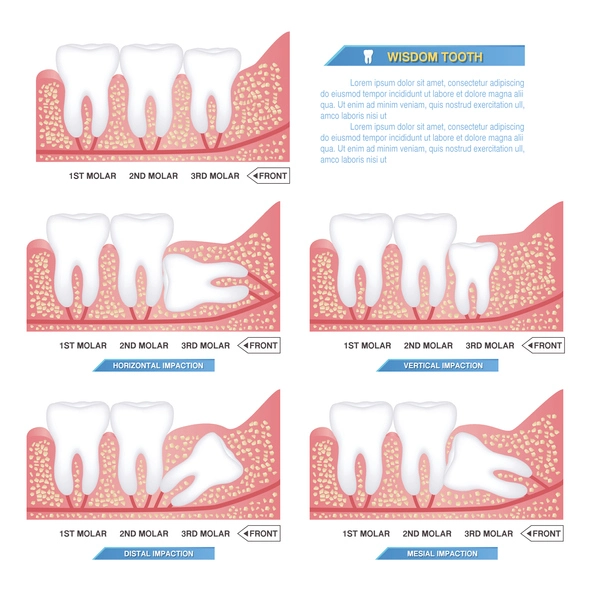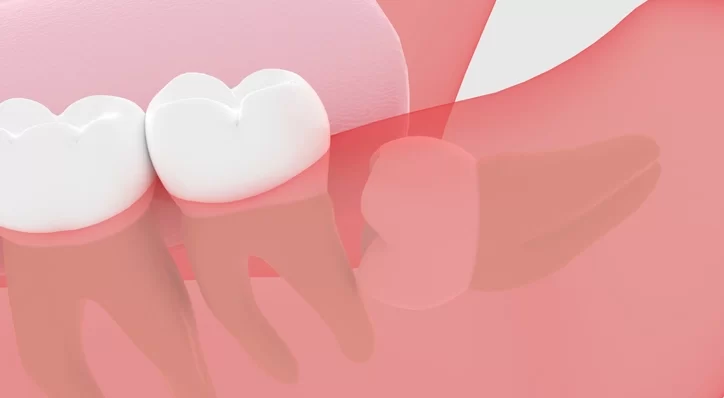Wisdom teeth, also known as third molars, are the last set of molars that typically emerge between the ages of 17 and 25. While they can be beneficial for some individuals, for many others, these teeth can pose various problems, especially when they become impacted.
Table of Contents
ToggleWhat Are Impacted Wisdom Teeth?
Impaction occurs when wisdom teeth don’t have enough space to emerge properly or they develop at an angle, causing them to get trapped within the jawbone or the soft tissue. This condition can lead to numerous dental issues and discomfort.
Causes of Impacted Wisdom Teeth
- Lack of Space
- Misalignment
- Late Development
Lack of Space
The most common cause of impacted wisdom teeth is insufficient space in the jaw for them to erupt normally. As a result, they may grow sideways, tilt, or remain trapped beneath the gum line.
Misalignment
Sometimes, the angle at which the wisdom teeth grow can also cause impaction. If they grow towards the neighboring teeth or at an odd angle, it can lead to impaction.
Late Development
Wisdom teeth usually emerge in the late teens or early twenties. However, if they develop later, there might not be adequate space for them.
Symptoms of Impacted Wisdom Teeth
Identifying impacted wisdom teeth early can help in preventing potential complications. Common symptoms include:
- Pain or Discomfort
- Swelling
- Difficulty Opening Mouth
- Bad Breath
Pain or Discomfort
Discomfort in the back of the mouth or jaw is a typical sign of impacted wisdom teeth.
Swelling
Swelling around the gums in the back of the mouth can indicate impaction.
Difficulty Opening Mouth
Limited jaw movement or difficulty in opening the mouth fully can be due to impacted wisdom teeth.
Bad Breath
Infection around the impacted tooth can cause bad breath or an unpleasant taste in the mouth.
Types of Impaction

There are various types of impaction based on how the wisdom tooth is positioned:
Mesial Impaction
The tooth is angled towards the front of the mouth, pressing against the neighboring tooth.
Vertical Impaction
The tooth is attempting to emerge normally but doesn’t have sufficient space to do so.
Horizontal Impaction
The tooth grows sideways, putting pressure on the adjacent teeth.
Distal Impaction
The tooth is angled towards the back of the mouth.
Complications of Impacted Wisdom Teeth
Leaving impacted wisdom teeth untreated can lead to several complications:
- Infection
- Damage to Other Teeth
- Cysts or Tumors
Infection
Impacted teeth can create a space for bacteria to accumulate, leading to infections like pericoronitis (inflammation of the gum tissue around the tooth).
Damage to Other Teeth
Impacted wisdom teeth can push against adjacent teeth, causing misalignment or damage.
Cysts or Tumors
In some cases, a sac can form around the impacted tooth, resulting in the development of cysts or, rarely, tumors.
Diagnosis
A dentist can diagnose impacted wisdom teeth through a physical examination and X-rays. X-rays provide a clear picture of the positioning of the teeth and help determine the best course of action.
Treatment Options
- Observation
- Extraction
- Pain Management
- Home Care
Observation
In some cases, if impacted wisdom teeth aren’t causing any issues, a dentist might suggest keeping an eye on them through regular check-ups.
Extraction
Extraction is the most common treatment for impacted wisdom teeth. It involves a minor surgical procedure performed by a dentist or oral surgeon.
Simple Extraction
If the tooth has partially emerged, a simple extraction can be performed.
Surgical Extraction
For impacted teeth, surgical extraction is necessary. The dentist or oral surgeon makes an incision in the gum and removes the wisdom tooth.
Pain Management
Prior to extraction, dentists might recommend pain relievers or antibiotics to manage pain and prevent infection.
Home Care
After extraction, following proper home care instructions such as applying ice packs, eating soft foods, and maintaining oral hygiene is crucial for healing.
Recovery
The recovery period after wisdom tooth extraction varies for each individual. Generally, discomfort or mild pain might persist for a few days, but it can be managed with prescribed medications.
Post-Extraction Care
Following the extraction of impacted wisdom teeth, proper post-operative care is essential for optimal healing and to prevent complications. Here are some additional details on what to expect and how to manage the post-extraction phase:
- Bleeding
- Swelling and Pain
- Eating and Drinking
- Oral Hygiene
- Follow-Up
- Complications
- Long-Term Oral Health
Bleeding
After the procedure, some bleeding is normal. Your dentist or oral surgeon will provide you with gauze pads to bite down on to help control bleeding. Change these pads as instructed and avoid rinsing your mouth vigorously to prevent dislodging blood clots.
Swelling and Pain
Swelling and discomfort around the extraction site are common after the surgery. Applying ice packs to the cheeks outside the affected area can help reduce swelling. Pain medications prescribed or recommended by your dentist can alleviate discomfort.
Eating and Drinking
Stick to soft foods and avoid chewing near the extraction site to prevent irritation. Drink plenty of fluids but avoid using straws as the sucking motion might dislodge the blood clot, leading to a painful condition known as dry socket.
Oral Hygiene
Maintaining proper oral hygiene is crucial during the healing process. Gently rinse your mouth with warm salt water after meals to keep the area clean. Be careful not to brush the extraction site too vigorously to avoid irritation.
Follow-Up
Attend any scheduled follow-up appointments to ensure proper healing. Your dentist will assess the extraction site and provide further guidance on post-operative care if needed.
Complications
While complications are rare, it’s essential to be aware of signs that might indicate a problem. Contact your dentist if you experience severe pain, excessive bleeding, persistent swelling, fever, or any other concerning symptoms.
Long-Term Oral Health
Removing impacted wisdom teeth usually resolves the immediate issues, but it’s essential to continue regular dental check-ups to maintain good oral health. Your dentist can monitor your mouth for any further developments and provide guidance on preventive measures.
Conclusion
Impacted wisdom teeth can cause considerable discomfort and lead to various dental complications if left untreated. Timely diagnosis and appropriate treatment, whether through observation or extraction, are crucial in preventing potential issues associated with impacted wisdom teeth.
If you suspect you have this problem or are experiencing any symptoms mentioned, consulting a dentist promptly is advisable to determine the best course of action for your oral health.
Understanding the causes, symptoms, treatment options, and potential complications associated with impacted wisdom teeth can help individuals make informed decisions regarding their dental care.
Remember, seeking professional dental advice is crucial for proper diagnosis and management of this problem.

